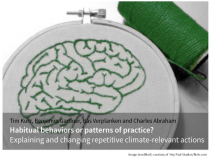- About
- Team
- Projects
- Children and the Environment
- ELiCiT (Exploring lifestyle changes in transition)
- Foundations for Sustainable Living
- HABITs
- Mapping Rebound Effects
- PASSAGE (Prosperity and Sustainability in the Green Economy)
- Policy Dialogue
- Price Responsiveness of Demand in Energy
- Resilience and Sustainable Lifestyles
- Sustainability Transitions in Food Systems
- Sustainable Living in Remote Rural Scotland
- Publications
- News
- Events
Living up to expectations: estimating direct and indirect rebound effects for UK households
| Title | Living up to expectations: estimating direct and indirect rebound effects for UK households |
| Publication Type | SLRG Working Paper |
| Year of Publication | 2015 |
| Authors | Chitnis, M, Sorrell, S |
| Volume | 1 |
| Abstract | This study estimates the combined direct and indirect rebound effects from various types of energy efficiency improvement by UK households. In contrast to most studies of this topic, we base our estimates on cross-price elasticities and therefore capture both the income and substitution effects of energy efficiency improvements. Our approach involves estimating a household demand model to obtain price and expenditure elasticities of different goods and services, utilising a multiregional input-output model to estimate the GHG emission intensities of those goods and services, combining the two to estimate direct and indirect rebound effects, and decomposing those effects to reveal the relative contribution of different mechanisms and commodities. We estimate that the total rebound effects are 63% for measures that improve the efficiency of domestic gas use, 53% for electricity use and 46% for vehicle fuel use. The primary source of this rebound is increased consumption of the cheaper energy service (i.e. direct rebound) and this is primarily driven by substitution effects. Our results suggest that the neglect of substitution effects may have led prior research to underestimate the total rebound effect. However, we provide a number of caveats to this conclusion, as well as indicating priorities for future research. |













